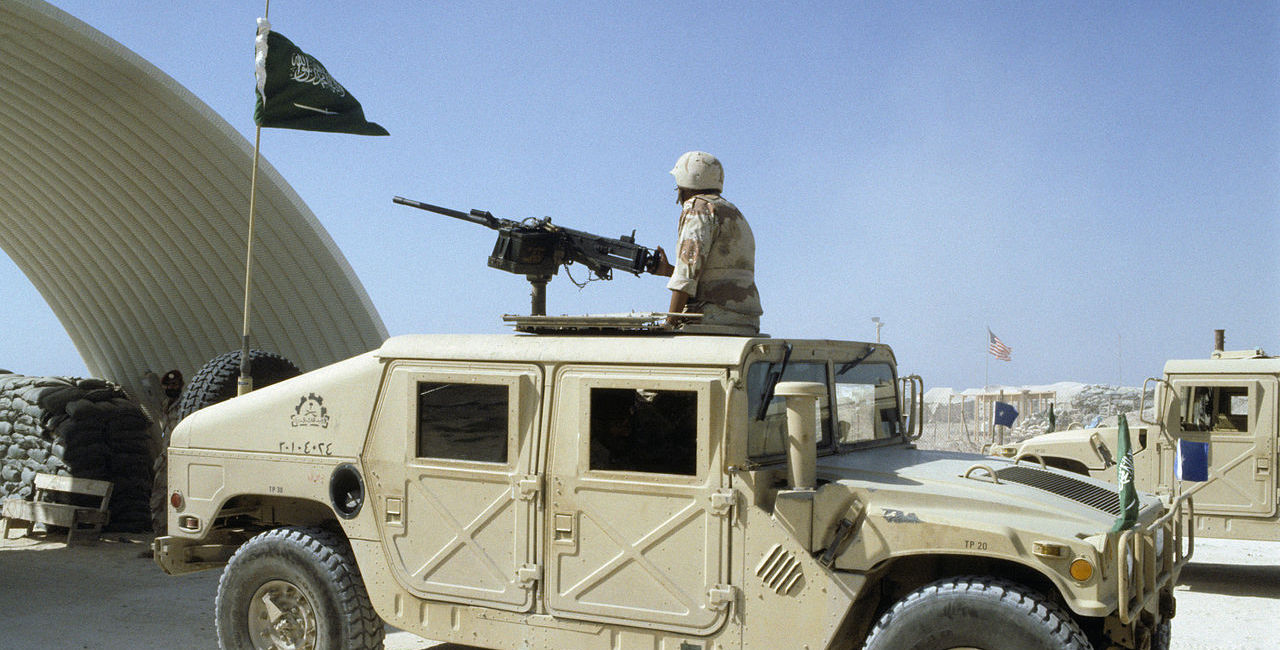With each passing day, Canada’s sale to Saudi Arabia of $15 billion of light armoured vehicles looks more and more indefensible. A damning Globe and Mail survey in September confirmed what the media and political opponents had been saying for years: 64 per cent of Canadians “opposed” or “somewhat opposed” the sale of arms to a country notorious for its human rights abuses.
Most Canadians know intuitively the deal was wrong despite government claims that Canada’s export controls are among the most stringent in the world. Canadians opposed this deal despite being repeatedly reminded that thousands of well-paying jobs in London Ontario would be lost if Canada reneged. While ex-Foreign Minister Stéphane Dion couldn’t make the connection between light armoured vehicles being used by the Saudis to violently suppress minority Shia protestors, Canadians being surveyed could.
Beyond its infamous reputation as a country which cuts off the hands of thieves, decapitates more serious suspects, and jails bloggers, the Kingdom has also become a neighbourhood bully in recent years. Under the rash hand of 32-year-old Crown Prince Mohammed bin Salman — the heir apparent to his father, King Salman — the country has opened belligerent fronts with Yemen to the south, Qatar to the east, and Lebanon to the north. The country’s war and blockade in Yemen is credited with putting 400,000 children at risk of death from severe acute malnutrition.
So the next step for Canada is to make sure it never again inks such an absurd and unethical deal: that government decision-makers of the future have the necessary tools to make principled trade decisions. Fortunately, the Trudeau government has the opportunity of a generation as the House of Commons debates Bill C-47 and Canada’s accession to the international Arms Trade Treaty (ATT.)
The ATT is highly laudable, with the lofty goals of contributing to international peace, reducing human suffering and promoting transparency in the international arms trade. That the Trudeau government had tabled C-47 was initially a good sign. The Harper government had refused to engage on the ATT for years, with the result that Canada was uncharacteristically absent from the early discussions on the treaty.
Despite the government’s seeming interest in signing on to the ATT, C-47 is highly flawed. In fact, if the bill passes without amendments Canada will “accede” to the treaty in name only. Canadian disarmament, development and human rights organizations have identified about a dozen serious shortcomings with the legislation, two of which are particularly egregious.
First, unless amended, C-47 will exempt Canadian military exports to the United States from the licensing and reporting requirements of the ATT. Such an exception would be grossly incompatible with the letter and spirit of the ATT, which calls for the “highest possible common international standards” on all military exports. While any exception to the ATT’s requirements would be suspect, an exception for arms sales to the US — which represent over half of Canada’s weapons exports — would be especially troublesome.
The second glaring shortcoming of C-47 is that it does not establish a legally binding mechanism on the government to block arms sales which do not pass an objective risk assessment test. It is exactly such a similar loophole which allowed successive Canadian governments to approve the $15 billion Saudi Arms Deal despite the better judgement of Canadians. In testimony before the Foreign Affairs Subcommittee, witnesses for the government and the defence industry tried to argue that C-47 need merely require the “consideration” of certain risk factors to be compliant with the ATT. These same voices went on to argue that such risk “considerations” should be defined on-the-fly through government regulations rather than being codified in C-47 itself.
Both of these contentions are problematic. To begin with, the simple consideration of risk factors in an arms sale would not meet the standard established by the ATT. Worse, leaving the key considerations to regulations would open the door to widespread abuse. Unlike statutes, regulations are easily amended and can be removed or added by the government without need of Parliamentary oversight or approval. As such, Parliament itself would be unable to ensure compliance with the ATT.
Canada should accede in full to the ATT — it is the moral and logical obligation of a country which claims to be enlightened and peace-loving. Unfortunately, the convoluted government arguments defending C-47 as written sound much like the hemming and hawing of Canadian leaders around the Saudi arms deal. With the proper amendments to C-47, Canada has an opportunity to prevent the suffering of thousands of innocents, and raise the ethical bar on international arms sales. Let’s not wait another generation before taking this necessary and courageous step.
Photo: PV2 Andrew W. McGalliard/Wikimedia Commons
Chip in to keep stories like these coming.




